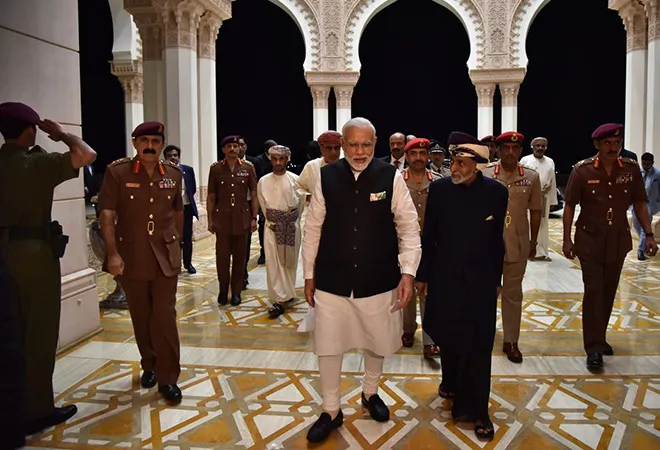Prime Minister Narendra Modi will once again shift his attention to the Middle East this week when he embarks on a four-day visit to Palestine, UAE and Oman from February 9 to February 12. The Modi government has paid sustained high-level attention to the Middle East since coming to office and the Prime Minister himself has already paid high-level visits to the UAE, Saudi Arabia, Qatar, Israel and Iran in the last four years. External Affairs Minister Sushma Swaraj is also in Saudi Arabia this week where India has been accorded the honour of being the “Guest of Honour” at the Janadriyah festival organized annually since 1985. Iranian President Hasan Rouhani is also expected to be in India this month and Saudi King Salman bin Abdulaziz Al Saud later this year. Israeli Prime Minister Benjamin Netanyahu has had a high profile visit to India last month. Clearly, the region is engaging New Delhi with a degree of seriousness not evident in the past.
This is as much due to the far-reaching geopolitical changes that are shaping the region as it is due to Modi government’s pro-active outreach. New powers like China and Russia are making their presence felt in the Middle East as old relationships undergo transformations and new actors challenge the authority of the established states. Extant powers like the US are shifting their gaze away from the region. Instead of being dependent on the region’s oil, the US is now exporting natural gas to the Middle East. Countries like the UAE, Kuwait and Jordan are now buying LNG from the US. Though the US Navy’s Fifth Fleet still cruises the Persian Gulf ostensibly to protect energy shipments flowing out of the Strait of Hormuz, it is only a matter of time before its role evolves. In contrast, China and India are today the world’s largest net oil importers and much of their crude comes from countries in the Middle East. India relies on the region for almost 65 per cent of its crude supplies. The security of those oil flows will be an increasingly pressing worry as the economies of China and India continue to expand and their domestic consumption rises.
Clearly, for India, a reorientation of its “Look West” policy has been in order. In his second visit to the UAE in less than four years, Modi will be the “Guest of Honour” at the World Government Summit in the country. Modi will be visiting Oman, a key Indian Ocean country which is also a member of the Indian Ocean Rim Association which aims at strengthening regional cooperation and sustainable development within the Indian Ocean region.
But it will be Modi’s visit to Ramallah, the first ever by an Indian PM to a Palestinian territory, which will be keenly watched. It comes weeks after India hosted the Israeli Prime Minister and months after Indian Prime Minister visited Israel. As the first non-Arab country to recognise Palestine Liberation Organisation (PLO) as “the sole and legitimate representative of the Palestinian people” and one of the first countries to recognise the Palestine State in 1988, New Delhi has important legacies to preserve. However, the nature of this relationship has evolved in light of changing global and regional realities.
New Delhi has now effectively de-hyphenated Israel from Palestine and is confident of engaging with the two independent of each other. During his Israel visit, Modi not only did not visit Palestine but also did not mention the Palestinians in public. Though New Delhi hosted Palestine Authority President Mahmoud Abbas in May last year before Modi’s Israel visit and had reassured him of India’s “unwavering” support towards the Palestinian cause, there was no public hectoring about the Palestinian issue. There was also no mention of East Jerusalem being the capital of the future Palestinian state during Abbas’ visit as New Delhi made clear its preference in favour of a negotiated compromise between the two sides.
The Arab world itself is preoccupied with a whole host of socio-economic challenges and the geopolitical challenges are shaping their threat perceptions. They have bigger things to worry about, so their support of it is now merely in terms of rhetoric. Before focusing on Israel, Modi assiduously courted other regional players in the region like Saudi Arabia, Iran, Qatar and Iran and reassured them that engagement with Israel would not be at their expense.
India needs to protect the interests of more than seven million of its diaspora which lives and works in the Gulf and who have made India a major recipient of overseas remittances.
New Delhi, therefore is looking at a relationship with Palestine which is grounded in substantive realities of today and is focused on building real capacity. There will be MoUs for cooperation in agriculture and Modi will be inaugurating a training institute for Palestinian diplomats. India is helping Palestine build a technology park in Ramallah and a centre for excellence in ICT in Gaza. India’s budgetary support of $60 million to Palestine will increase as the engagement becomes more forward-looking and projects based.
Modi’s visit to the Middle East this week will be a reminder how far Indian foreign policy has travelled in the last few years in its engagement with its ‘near abroad.’
This commentary originally appeared in DNA.
The views expressed above belong to the author(s). ORF research and analyses now available on Telegram! Click here to access our curated content — blogs, longforms and interviews.




 PREV
PREV


